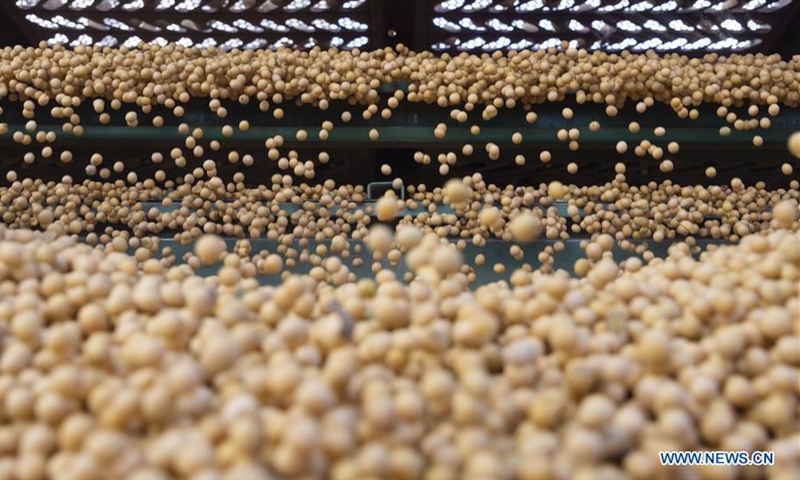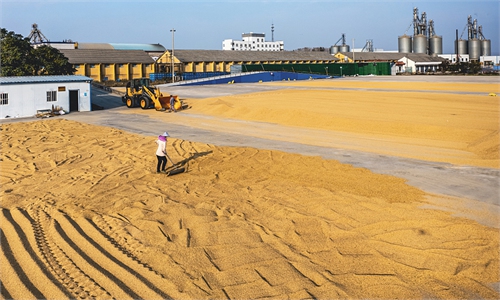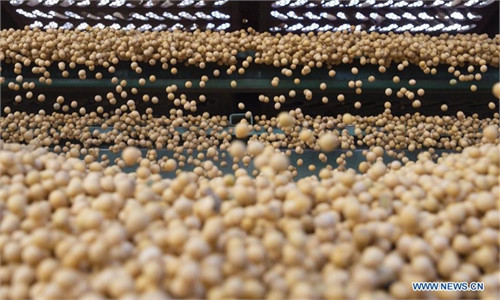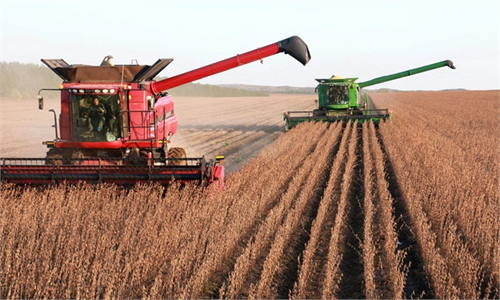China’s soybean supply guaranteed despite price hikes: experts
Domestic soybean supply guaranteed despite price hikes: experts

Newly procured soybeans are transferred to silos of China Grain Reserves Group in Harbin, northeast China's Heilongjiang Province, Nov. 8, 2019. A new round of food grain procurement in the autumn period is ongoing in Heilongjiang Province, China's top grain producer.Photo:Xinhua
The domestic supply of soybeans is guaranteed despite the complex environment in the international market, Chinese experts said, after feed and soybean prices continued their recent surges that have taken them to multi-year highs amid the Russia-Ukraine situation.
Global soybean prices rose to multi-year highs recently due to the impact of soybean production cuts in South America and rising crude oil prices.
But despite rising soybean prices, the domestic supply is ensured, with more government reserves coming onto the market and an expected increase in the domestic soybean planting area this season, Wang Liaowei, senior economist from the China National Grain & Oils Information Center, told the Global Times on Thursday.
According to data from Baichuan Information, as of Tuesday, the average price of domestic soybean meal hit 4,928 yuan ($776) a ton, up nearly 40 percent compared with the beginning of the year, and the highest level in nine and one-half years.
Following hikes in the prices of raw materials, multiple livestock and poultry feed enterprises have announced plans to lift prices by 50-300 yuan per ton.
Da Bei Nong Group has announced plans to raise pig concentrate products by 300 yuan a ton, and Neijiang Chia Tai Co has announced a price hike of 250 yuan a ton for all pig feed and one of 50 yuan a ton for chicken and duck feed.
Amid the price hikes, state-owned enterprises have been boosting supplies through auctions.
As of March 14, the China Grain Reserves Corporation Group (Sinograin) had held two auctions of imported soybean oil, with a total traded volume of 186,000 tons. The National Grain Trade Center organized an imported soybean auction, which clinched a deal for 256,000 tons.
"It is expected that similar policies will continue, which will effectively increase domestic soybean supply," Wang said.
In addition, with more policy support to encourage sowing, it is estimated that China's soybean planting area will increase by more than 20 million mu (1.33 million hectares) in 2022 from last year and exceed the 2020 level, given normal weather conditions, Wang noted.
With a self-sufficiency rate of less than 20 percent, soybeans are one of the few grains for which China relies heavily on imports. Major sources of imports are the US, Brazil and Argentina.
Whether China will increase soybean imports depends on domestic supply and demand and international prices, Jiao Shanwei, editor-in-chief of cngrain.com, told the Global Times on Thursday.
"Since the tension between Russia and Ukraine has caused sharp rises in international grain prices and weakened the advantage of imported grain, it is not a good time to sign new trade orders at this stage," Jiao said.
"If the situation eases and international food prices fall and cost-performance advantages return, imports of corn, soybeans and other grains are likely to increase," he said.
In 2021, China imported more than 90 million tons of soybeans, and the volume in 2020 reached over 100 million tons, customs data showed.



